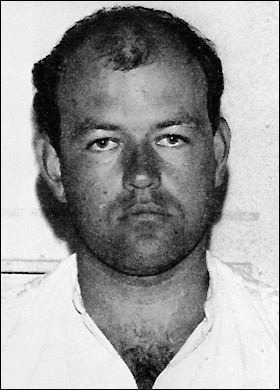

 By VennerRoad, 6th May 2016
By VennerRoad, 6th May 2016
Can the Parole Board be seriously considering the release of a double rape-murderer? It appears so.

Leslie Van Houten looking her age and then some.
What should be the fate of convicted murderers? In the West we have by and large abolished the death penalty, so there are in practice only two answers to that question: they will be locked up literally for the rest of their lives, or at some point, they will be paroled. Although this latter option is often difficult for the families and friends of their victims to accept, many convicted murderers are released to go forth and sin no more. Now the question becomes not will murderers be paroled but which ones will be paroled?
Not all murders are created equal, so common sense dictates that some perpetrators are less undeserving of release than others. One would expect a man who gets into a drunken fight and stabs another man to death to be more readily considered for parole than a man who rapes and murders a teenage girl. If one would, then one would be wrong.
Currently, two double killers are being considered for parole, on both sides of the Atlantic, and the reaction from the families of each of the victims has been, understandably, one of outrage.
Unless you are either American or a crime buff of a certain vintage, the name Leslie Van Houten will probably not mean anything to you. Okay, try Charles Manson. On August 8, 1969, members of Manson’s “Family” entered the home of Sharon Tate, and slaughtered the heavily pregnant actress in an act of calculated barbarity that remains shocking to this day. Four other people died with her. The following night, the Manson Family reprised their horror with a double murder, that of Leno and Rosemary LaBianca. Together these became known as the Tate-LaBianca murders. Van Houten was present at the latter crime scene, and took an active part, first holding down Mrs LaBianca, and then stabbing her repeatedly.
Although several motives have been advanced for this carnage, one of them truly bizarre, these were murders committed for what the man on the Clapham omnibus and the housewife would not regard as rational, only deeply disturbed and warped.
Supporters of and apologists for Van Houten argue that but for the notoriety of the Tate-LaBianca murders, she would have long been paroled. That argument has some merit, but the mitigating factors – principally her age and her heavy drug use – are far outweighed by her willing subservience to Manson, which defies the claim that somehow he managed to brainwash her and the rest of his followers, as if they had no free will at all.
On this side of the Atlantic, Colin Pitchfork is in his own way even more notorious than Leslie Van Houten being the first murderer convicted anywhere on the basis of DNA evidence; his case was also the first DNA exonoration. Pitchfork has no mitigation at all for his crimes, for several reasons. He was 22 years old when he committed his first murder; his victim, 15 year old Lynda Mann, was raped and strangled. Prior to that he had already indecently assaulted a girl as a teenager, in February 1979.
While a man who committed one rape-murder might have some hope of eventually being paroled, Pitchfork went on to rape and murder another 15 year old, 3 years later. Two crimes of this nature are far worse than a double murder, which might just be committed in the heat of the moment or considered as a single transaction of madness, but there is more.
Pitchfork stood by while an innocent teenager was arrested for the second murder, and as this obviously none too bright youth confessed, he might have got away with his crimes – and gone on to kill again – but for the timely invention of DNA profiling. Indeed, as with Lewis Sproston who was the prime suspect in the September 2005 murder of Sally Anne Bowman (who did not confess), Richard Buckland might well have suffered the ultimate punishment in an earlier era and his name been reviled forevermore. But we are still not finished, because leaving aside the other steps he took to cover his tracks, Pitchfork attacked yet another girl, in October 1985. At his trial, in addition to the two murders he pleaded guilty to the aforementioned February 1979 indecent assault, and this later attack, which today would have been charged as rape. Given all this, on what basis can Pitchfork be considered for parole? Apparently it’s because he has been nice to blind people.
At his trial in January 1988, Pitchfork was given a 30 year tariff. In 2009, this was reduced to 28 years due to his “exceptional progress”; inter alia he has been transcribing printed music into Braille. So did Michael Ross; he was executed in May 2005 for the murders of eight women, seven of whom he raped. Does it matter how much “exceptional progress” a man makes when he has done something as terrible as this again and again?

Double murderer Colin Pitchfork.
The parole system is part of the checks and balances built into the criminal law; even so, one would expect it to pay no more than lip service to someone who has committed crimes of this nature. Pitchfork should consider himself fortunate to have the quality of life he has, because in an earlier era he would surely have been sentenced to death.
Leslie Van Houten was sentenced to death, but due to the moratorium on capital punishment in the United States following the Supreme Court decision in Furman v Georgia, (1972), her sentence like all the others was commuted to life imprisonment. For technical reasons, Van Houten had not one but two retrials; she was actually granted bail before the second retrial, but her conviction was affirmed.
During all that time, Van Houten’s behaviour spoke for itself; she was no more a teenager, and rejected categorically the idea that she had been brainwashed by Manson. Her honesty may have been commendable, but it proved that the horrors of her crimes aside, she was not a nice person, and that she belonged behind bars. Most people would argue that she still does.
If a case can be made out for paroling Van Houten, it beggars belief anyone with half a brain could even think about releasing Pitchfork, at least until he is able to walk only with a Zimmer frame, and the next 15 year old girl he attacks will wrap it around his neck before kicking him where it hurts. Is Pitchfork still a menace to society? In a way that question is irrelevant; the reality is that some crimes are beyond rehabilitation and second chances the same way they are beyond forgiveness. Sadly though, the recommendation that he be transferred to an open prison should surprise no one, because we’ve been here before.
In 1973, Royal Navy reject David McGreavy committed a triple murder even more shocking than Pitchfork’s crimes. Left to babysit for his friend Clive Ralph while the lady of the house, Elsie, was working an evening job, McGreavy became incensed by the baby’s crying. He fractured her skull, slit the throat of her 2 year old sister, and strangled her 4 year old brother. Then he mutilated the bodies with a pickaxe and impaled them on the railings outside the house. That unspeakable, unthinkable crime, earned McGreavy the appellation Monster of Worcester. He pleaded guilty, so there was no meaningful trial. The judge gave him a mere twenty year tariff, but probably he considered that academic, for how could such a man ever be released?
As early as 1995 though, McGreavy was transferred to an open prison, and in 2006 he was allowed out to stay at an approved address in Liverpool. Thankfully, someone, probably a Home Office official, leaked the story to a tabloid, and after he was photographed walking the streets, the balloon went up, and he has been back behind bars proper where he belongs ever since.
How can this sort of madness be stopped? One way would be by denying Legal Aid for applications of this nature. It is nothing less than scandalous that public money be squandered on men like McGreavy and Pitchfork. The vast majority of people in prison – men, women and the young – are not beyond redemption, especially those who are serving relatively short sentences, short in real time but long enough to lose their jobs, often their homes, and to be set on a downward spiral so that many end up serving a life sentence on the installment plan. It would be far more humane and productive to reallocate such funds to spend on them.
For all the good it will do, the sister of one of Pitchfork’s victims has started a petition; at the time of writing it has reached a shade over 20,000 signatures. By contrast, well over half a million signed a petition to keep Donald Trump out of the UK. Which of these men would you rather see walking the streets here? Nuff said!
Having said that, there is something else the authorities would need to take into consideration before releasing either Van Houten or especially Pitchfork, the likelihood of vigilante attacks. Both genuinely outraged members of the public and people out to make a name for themselves would be likely to ferret them out were they released except under conditions of extreme anonymity. In practice, this would probably mean spending enormous sums of money and squandering precious human resources, and for what?
Both Leslie Van Houten and Colin Pitchfork should be left to rot.
To Wikinut Articles Page